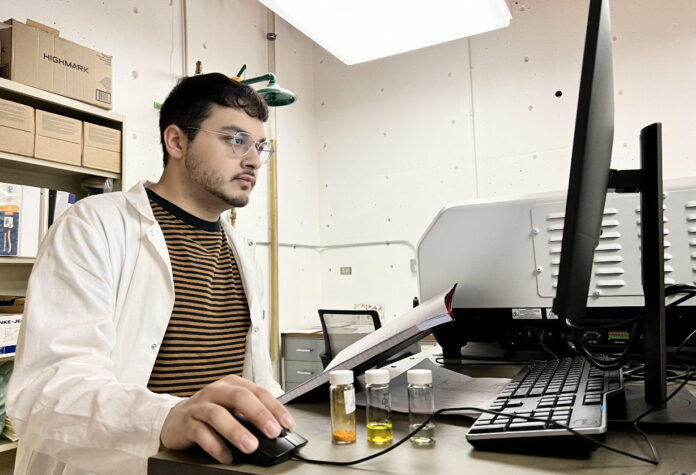
UNLV Professor Pradip Bhowmik’s materials chemistry lab has been at the forefront of green chemistry research and more recently, achieving a breakthrough discovery on ionic conductivity.
In July of last year, the lab published a chapter titled “High Ionic Conductivities of Ionic Materials as Potential Electrolytes” within the journal “Industrial Applications of Ionic Liquids.” In the chapter, Bhowmik and his students noted that they discovered a new material that can compete with benchmark materials that are currently being used in the market for batteries.
The chapter’s abstract highlights that ionic liquids are salts of organic cations and hold promise as engineered materials in a variety of modern fields. Bhowmik states in the aforementioned chapter, “They are used as green solvents or catalysts for chemical reactions, biocatalysts, biopolymers processing, active pharmaceutical ingredients in medicine, even as electrolytes for batteries.”
David King, a graduate student in the lab, has been a member since spring of 2020 and played an integral role in many of its projects.
“Using this lab as a stepping stone, I want to be able to develop the technical skills and leadership necessary to pursue my passions of being an organic chemistry professor where I can mentor and guide other students in material chemistry,” King said.
King and other lab members have been a large part of the effort to study the ionic conductivity of certain materials.
“Our lab recently made a discovery on ionic liquid crystals,” said King. “It [ionic crystals] has the highest conductivity that has been reported in literature.”
King adds that Bhowmik has extensively studied the materials for a very long time. Bhowmik’s studies led to him putting several oxygen molecules on the created chain, rather than leaving it as a plain carbon chain. King’s lab mate, Si Chen, was responsible for a large part of this process and worked on synthesizing these molecules over the summer of 2022. Other lab members, Sammy Cox and Jakob Smith, played a pivotal role in these experiments.
Through synthesizing these molecules, the lab discovered that the material had efficient ionic conductive properties. This led them to learn that this material could be a potential replacement for materials in fuel applications.
“We all know how environmentally harmful it is for some of these materials to be manufactured and released into the environment. Our goal is to basically make this material from organic building blocks in a very non-harmful way,” King continued. “It’s not completely environmentally safe, but it’s a safer alternative compared to the ones that are being manufactured and out in the market currently.”
Outside of the ionic conductivity breakthrough, the lab is also balancing more than ten projects. These projects are being overseen by Bhowmik and international collaborators from countries in Asia and Europe.
Soon, the lab will be spotlighted by the university for receiving a grant from the Governor’s Office of Economic Development. While King doesn’t know too much about the impact this upcoming grant will have, he knows it will really support the lab’s efforts to make groundbreaking discoveries.
Currently, King’s efforts in the lab are primarily being funded by the chemistry department through a graduate assistantship. While he is the only graduate student in the lab, undergraduates have opportunities to apply for external funding to support their work or receive support from the grants Bhowmik has or will apply to.
